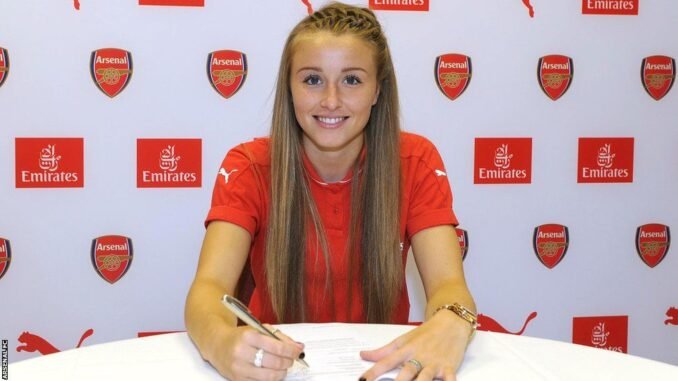
The news that Arsenal Women have handed captain Leah Williamson a landmark lifetime contract reverberated well beyond north London. In an era in which professional women’s football is only now beginning to generate sustainable revenues, the concept of a “one-club player” being formally tied to her team from academy beginnings to retirement is unprecedented. Arsenal’s decision is both a reward for Williamson’s unswerving loyalty and a strategic statement: the club aims to remain the pre-eminent destination for elite talent, and it is prepared to innovate contractually to keep its cornerstone. For supporters, the agreement crystallises something they always sensed—that Williamson, raised in Milton Keynes but Arsenal-obsessed since childhood, truly bleeds red and white.
Williamson’s path to this moment explains why the club deems her irreplaceable. She joined Arsenal’s Centre of Excellence aged nine, made her senior debut at 17 in 2014, and has since amassed more than 200 appearances, six major domestic trophies and, most memorably, captained England to Euro 2022 glory while still wearing the Gunners’ crest. On the pitch she is a technically refined, ball-playing centre-back who dictates tempo as comfortably as many midfielders; off it she is articulate, socially conscious and fiercely protective of the women’s game. Those combined qualities make her an ambassador as much as an athlete, and Arsenal intend to harness both facets.
Neither party disclosed exact figures, but club sources hint the lifetime deal includes incremental salary rises, performance bonuses, post-playing employment options in coaching or executive roles, and a structured plan for ambassadorial work worldwide. Effectively, Arsenal are investing in the totality of Williamson’s intellectual and emotional capital, guaranteeing she will influence the club’s direction long after her last tackle. For Leah, the security allows her to focus fully on performance and personal development without the annual speculation that accompanies contract cycles. She described it succinctly: “I know where home is, and now home knows it has me for good.” In a market in which Barcelona, Lyon and U.S. clubs routinely scout Europe’s best, that assurance is invaluable.
The ripple effects are immediate. Retaining Williamson stabilises the spine around which Jonas Eidevall can build title-challenging squads, reassuring talents such as Frida Maanum, Alessia Russo and Lina Hurtig that Arsenal’s ambition matches their own. Commercially, the club can ride Williamson’s growing global profile; sponsors relish continuity, and fans will invest in merchandise bearing a name they know won’t depart next summer. Strategically, Arsenal Women gain leverage when recruiting prospects from their academy and beyond, pointing to a pathway that ends not with a transfer abroad but with life membership in north London. Symbolically, the deal challenges boardrooms across the Women’s Super League to match Arsenal’s commitment if they hope to compete both on the pitch and in cultural relevance.
From a wider perspective, the lifetime contract is a watershed for the women’s game. It rubber-stamps the idea that female players merit the same long-term security historically afforded to male icons such as Francesco Totti or Ryan Giggs. Williamson’s outspoken advocacy for equality now has tangible backing, and her next mission is to convert that personal victory into collective gains: pushing for better medical facilities, parental policies and pay structures inside Meadow Park and across the WSL. “Legacy,” she noted in her announcement video, “is built by what you leave behind, not just the medals you lift.” Arsenal’s gesture ensures she will be an architect, not merely a participant, in shaping that legacy. With captain and club bound together for life, the future of Arsenal Women looks not only stable but exhilarating.
Leave a Reply